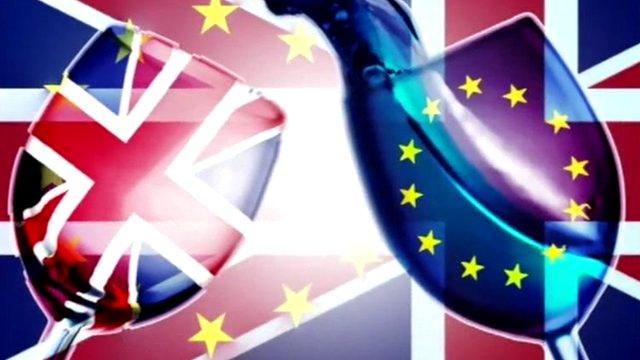EU referendum: 'No progress' so far on Cameron's talks
- Published
David Cameron arrives at EU summit 'to battle for Britain'
Negotiations on David Cameron's EU reform demands have made "no real progress" so far, Downing Street sources say.
The first EU Council session ended with no agreement on several issues as Number 10 played down hopes of a deal.
EU sources said the talks were "constructive" but said other countries had spoken out against the PM's plans.
Friday's session on the UK's demands has been put back to allow him to speak to individual leaders one-to-one.
The 28 EU leaders are now holding a working dinner to discuss their response to the migration crisis.
When talks return to the UK's reforms, Mr Cameron will seek to secure the deal which he wants before holding an in/out referendum on the UK's EU membership.
However, he has said he will walk away from the summit without agreement unless he gets a "credible" package he can sell to voters in the referendum.
The PM's Eurosceptic critics have branded the process a sham, saying that even if the reforms are agreed they will not allow the UK to block unwanted EU laws or affect the scale of EU migration.
BBC political editor Laura Kuenssberg said a Downing Street source was claiming the talks had reached an "impasse".
It is not clear whether the downbeat mood is "summit theatrics or genuine disappointment" that negotiations are not progressing, she added.
An EU source spoke of five key areas where agreement has not been reached:
How the EU's binding treaties will be altered to make the changes
How many member states can trigger an "emergency brake" on migrant welfare
For how long a member state can impose restrictions on in-work benefits for migrants
Whether child benefit curbs can be applied retrospectively
Changing treaties to alter the principle of "ever-closer" union
Thursday's meeting was "intense and constructive", an EU source said, but while all the countries confirmed their wish for the UK to stay in, some also set out specific concerns.
"We expected this," the EU source said: "But honestly we had hoped for some of them to be less critical."
Earlier, senior EU officials talked up the chances of a deal, with European Commission president Jean-Claude Juncker saying he was "quite confident" during the Council meeting and Council president Donald Tusk saying it was a "make-or-break summit".
Mr Cameron is now expected to meet Mr Tusk later to discuss how Friday's session will proceed.
Katya Adler looks at which European countries David Cameron can count on
Speaking as he arrived at the summit, Mr Cameron said: "I'll be battling for Britain. If we can get a good deal I'll take that deal. But I will not take a deal that doesn't meet what we need.
"I think it's much more important to get this right than to do anything in a rush. But with good will, with hard work, we can get a better deal for Britain."
The key parts of the UK deal include:
Allowing Britain to opt out from the EU's founding ambition to forge an "ever closer union" of the peoples of Europe and greater powers to national parliaments to block EU legislation
Restrictions on other EU nationals getting in-work benefits in the UK for four years. Changing child benefit rules so payment reflects cost of living in countries where the child lives
Explicit recognition that the euro is not the only currency of the EU and guarantees to ensure countries outside the eurozone are not disadvantaged or have to join eurozone bailouts
A target for the reduction of the "burden" of excessive regulation and extending the single market
France is thought to be resisting attempts to secure protection for the City of London by giving non-eurozone nations more power to stall financial regulation.
Mr Cameron's plan to cut the amount of child benefit EU migrants can send back to to their home countries would apply across the EU according to leaked versions of a draft deal - something that would be resisted by Poland, Hungary, the Czech Republic and Slovakia.
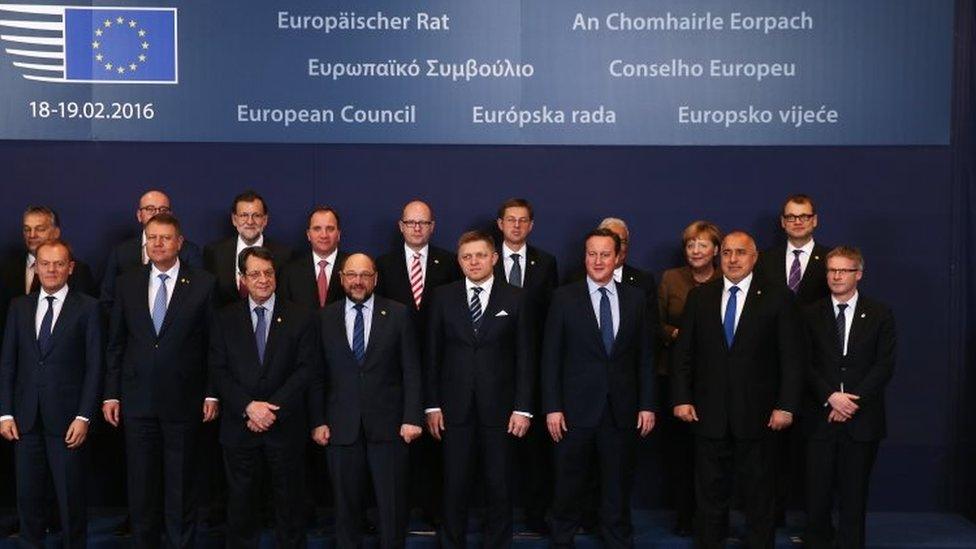
EU leaders pose for the traditional group photograph
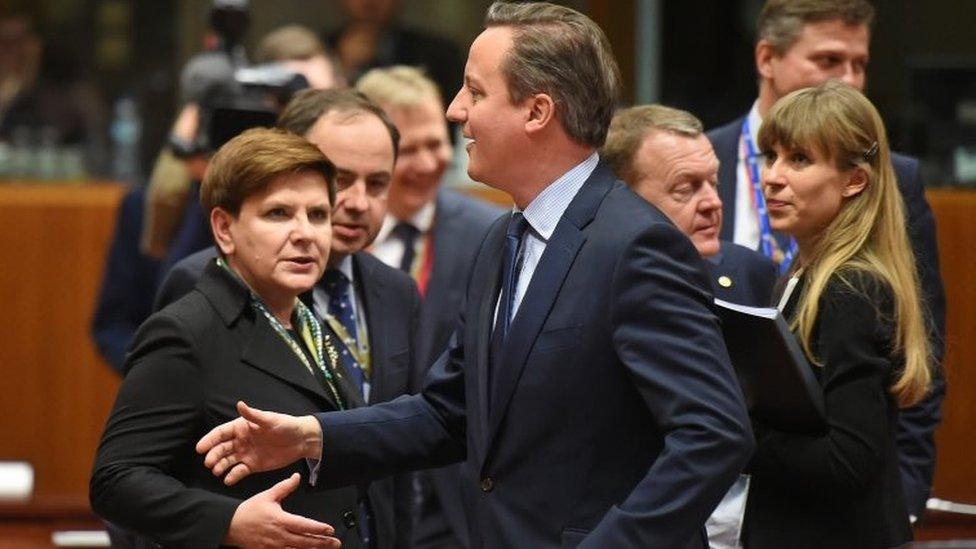
David Cameron about to be greeted by Polish Prime Minister Beata Szydto
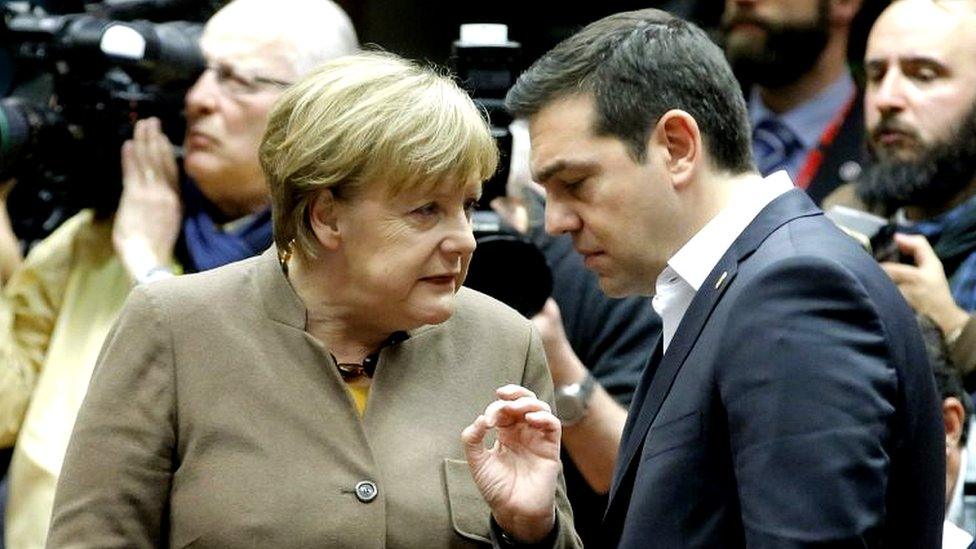
Angela Merkel deep in conversation with Greek Prime Minister Alexis Tsipras

Cameron's best chance?
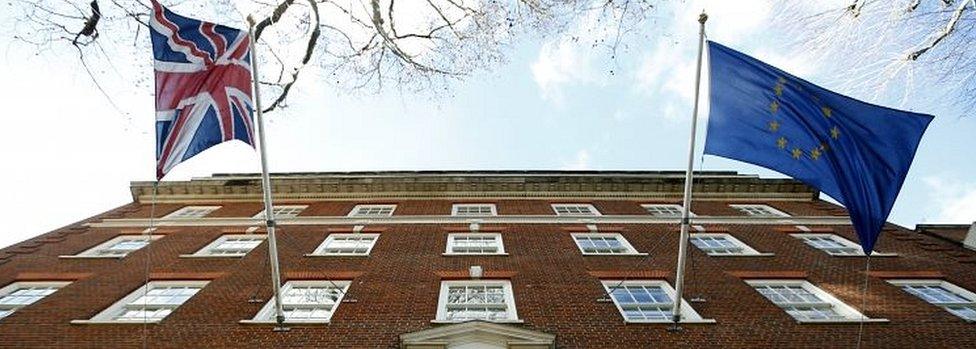
By Laura Kuenssberg, BBC political editor
Forget the fight over including one sentence or another, what goes in the square brackets or the footnotes of the deal.
There are so many countries involved, so many complications in these talks, it's easy to lose the big truth.
This is the best chance David Cameron has of getting a new deal with the European Union - there could always be another summit, more talks, more negotiations but there's no guarantee the terms would get any better for the UK. One senior UK diplomat told me: "The deal is as cooked as it is going to get".

UKIP leader Nigel Farage said he expected Mr Cameron to come back with a deal from Brussels, as the other leaders would recognise how "embarrassing" it would be for him to return empty-handed.
But he added: "He hasn't asked for us to get back supremacy for our Parliament, he hasn't asked for us to control our own borders, he hasn't asked to reduce the vast daily fees we pay.
"We will be allowed - after he has come here like Oliver Twist and begged for concessions - to control migrant benefits for up to four years. I find the whole thing as a British person pretty shameful."
How does the European Union work?
Conservative MEP Daniel Hannan dismissed the proposed deal and warned that any changes could be unpicked by the European Parliament in future.
He told BBC Radio 4's Today programme: "I don't know of any MEPs or Eurocrats in private who think that this is a fundamental change. All of the sound and fury, all of the negotiations, have come down to amending one directive - which we could have done at any time without needing any renegotiation.
"Privately, the Eurocrats were whooping and high-fiving and turning cartwheels because so little has been asked for."
Labour leader Jeremy Corbyn said his party will be campaigning for Britain to remain in the EU - but he branded David Cameron's renegotiations "a theatrical sideshow, designed to appease his opponents within the Conservative Party".

Brussels comes alive for Brexit showdown
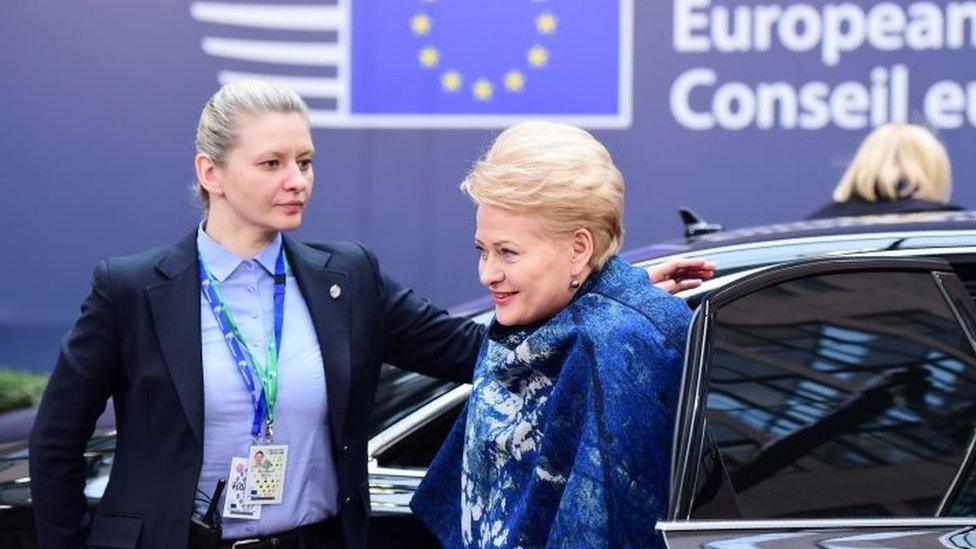
Lithuania's President Dalia Grybauskaite arrives at the Brussels summit
By BBC Europe Editor Katya Adler
Civil servants and MEPs I've spoken to in Brussels believe the expected UK referendum and Britain's EU renegotiation essentially came about because the PM was under pressure from his own Conservative party.
Yet in public, in the style of the Emperor's New Clothes, they go along with the idea that this is all for the British people.
But then Brussels is used to dealing with two UKs: one on stage, the other behind the scenes. Successive UK prime ministers have been openly dismissive, disparaging, even hostile at EU summits, "playing to their eurosceptic gallery at home," EU suits say knowingly, sotto voce, with a nod and a wink.

What happens next?
Thursday:
19:00 (20:00 local): Working dinner on the migration crisis
Mr Cameron is expected to hold one-on-one talks with leaders to try to find agreement
Friday:
10:00: Group discussions will continue
If David Cameron gets a deal, he will return to the UK as quickly as possible to hold an emergency cabinet meeting to reach an agreed position on remaining in the EU. At this point, ministers who want Britain out of the EU will be allowed to speak out.
Mr Cameron may then announce the date of the UK's referendum, although he does not have to do so
17 March:
The next scheduled EU summit - at which Mr Cameron could have another chance to get a deal. There has also been talk of a special summit at the end of February
Thursday 23 June:
Still seen as the most likely date of a UK referendum if Mr Cameron gets a deal in February or March, but he has until the end of 2017 to hold one

Read more:

- Published17 February 2016
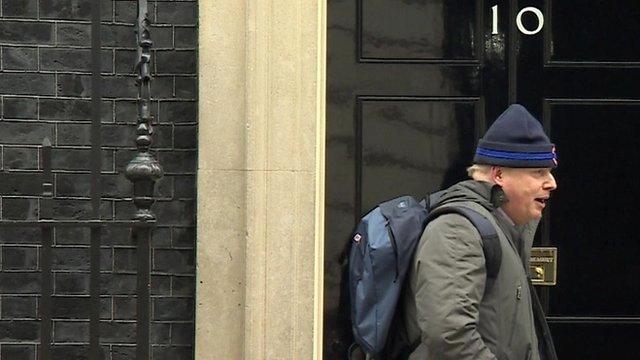
- Published16 February 2016
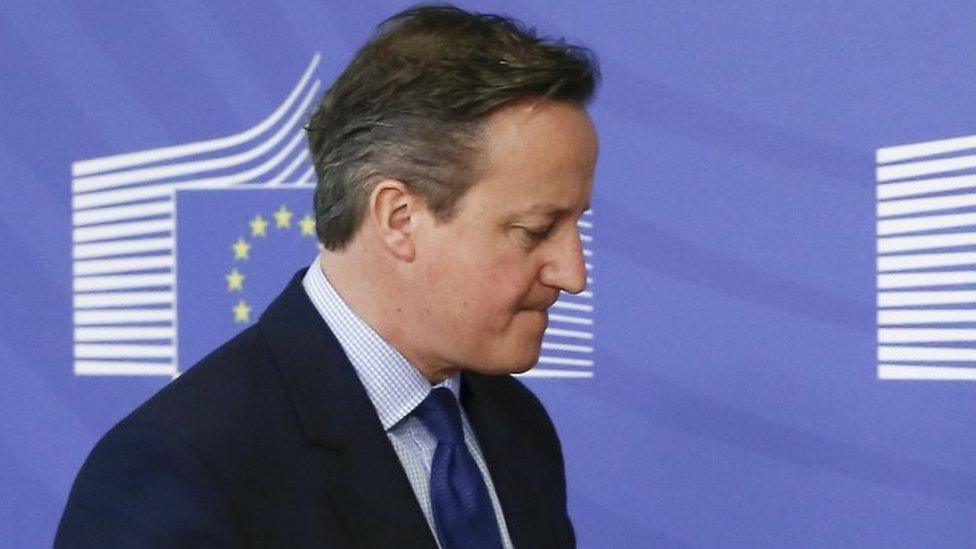
- Published26 May 2016
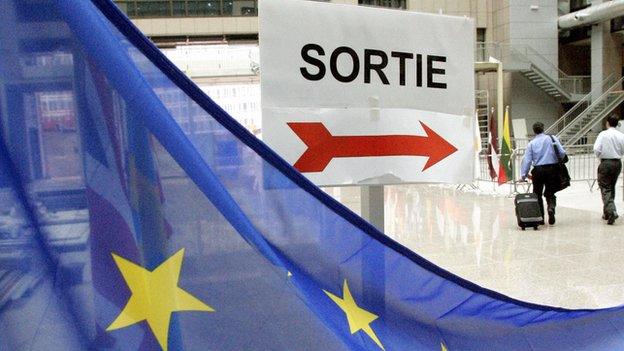
- Published16 February 2016
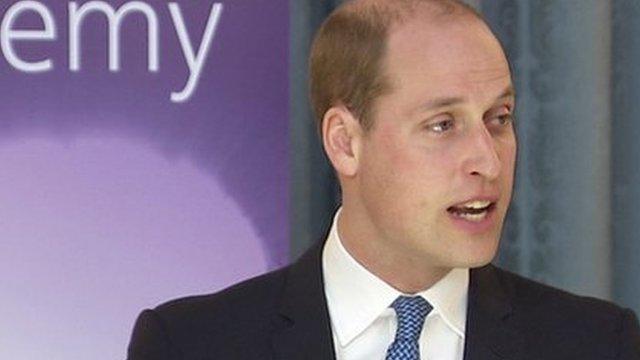
- Published16 February 2016
